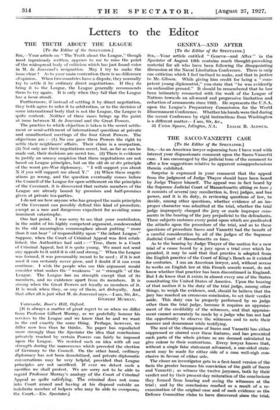Letters to the Editor
THE TRUTH ABOUT THE LEAGUE [To the Editor of the SPECTATOR.] SIR,—Your article on " The Truth about the League," though most ingeniously written, appears to me to miss the point of the widespread body of criticism which has just found voice in M. de Jouvenel's resignation. May I try to make the issue clear ? As to your main contention there is no difference of opinion. When two countries have a dispute, they normally try to settle it by ordinary direct negotiations. If they do bring it to the League, the League generally recommends them to try again. It is only when they fail that the League has a locus standi.
Furthermore, if instead of settling it by direct negotiation, they both agree to refer it to arbitration, or to the decision of some international body that is not the League, the League is quite content. Neither of these cases brings up the point at issue between M. de Jouvenel and the Great Powers.
The practice to which objection, is taken is the secret settle- ment or semi-settlement of international questions at private and unauthorized meetings of the four Great Powers. The objections, are :—(1) No one gave these Powers the right to settle their neighbours' affairs. Their claim is a usurpation. (2) Not only are their negotiations secret, but, as far as can be made out, their decisions are secret too. (3) There is evidence to justify an uneasy suspicion that these negotiations are not based on League principles, but on the old do ut des principle of the worst pre-War diplomacy. " I will support you about X if you will support me about Y." (4) When these negoti- ations go wrong, and the question eventually comes before the Council of the League for open settlement on the principles of the Covenant, it is discovered that certain members of the League arc already bound by promises and half-promises given at private tea-parties.
I do not see how anyone who has grasped the main principles of the Covenant can possibly defend this kind of procedure, except as a rare and dangerous expedient for avoiding some imminent catastrophe.
One last point. I was sorry to see that your contributor, in the midst of his highly competent argument, condescended to the old meaningless commonplace about putting " more than it can bear " of responsibility upon " the infant League." Suppose, when the Court of Criminal Appeal was first estab- lished, the Authorities had said :—" True, there is a Court of Criminal Appeal, but it is quite young. We must not send any appeals to it until it is old and strong." When the League was formed, it was presumably meant to be used ; if it is not used it can certainly never grow, and I doubt if it can even continue. I wish the people who use this argument would consider what makes the " weakness " or " strength " of the League. The League has no strength except that of its members, and no existence apart from its members. It is strong when the Great Powers act loyally as members of it. It is weak when they, or any of them, act disloyally. And that after all is just what M. de Jouvenel says.—I am, Sir, &e., latsconibe, Boar's Hill, Oxford. GILBERT MURRAY.
[It is always a matter of great regret to us when we differ from Professor Gilbert Murray, as we gratefully honour his services to the League and we know that he and we want in the end exactly the same thing. Perhaps, however, we differ now less than he thinks. No paper has repudiated more strongly than the Spectator the idea that conclusions privately reached by certain Powers can fairly be imposed upon the League. We resisted such an idea with all our strength during the manoeuvres which preceded the election of Germany to the Council. On the other hand, ordinary diplomacy has not been demobilized, and private diplomatic conversations may be very helpful, provided that League principles are not sacrificed. If ever we detect such a sacrifice we shall protest. We are sorry not to be able to regard Professor Murray's analogy of the Court of Criminal Appeal as quite satisfying. The criminal does not come into Court armed and having at his disposal outside an indefinite number of helpers who may be able to overpower the Court.—En. Spectator.]


































 Previous page
Previous page